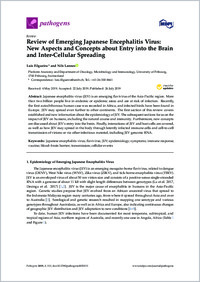Review of emerging japanese encephalitis virus: new aspects and concepts about entry into the brain and inter-cellular spreading
- Filgueira, Luis Platform Anatomy and Department of Oncology, Microbiology and Immunology, University of Fribourg, 1700 Fribourg, Switzerland
- Lannes, Nils Platform Anatomy and Department of Oncology, Microbiology and Immunology, University of Fribourg, 1700 Fribourg, Switzerland
-
01.09.2019
Published in:
- Pathogens. - 2019, vol. 8, no. 3, p. 111
English
Japanese encephalitis virus (JEV) is an emerging flavivirus of the Asia-Pacific region. More than two billion people live in endemic or epidemic areas and are at risk of infection. Recently, the first autochthonous human case was recorded in Africa, and infected birds have been found in Europe. JEV may spread even further to other continents. The first section of this review covers established and new information about the epidemiology of JEV. The subsequent sections focus on the impact of JEV on humans, including the natural course and immunity. Furthermore, new concepts are discussed about JEVs entry into the brain. Finally, interactions of JEV and host cells are covered, as well as how JEV may spread in the body through latently infected immune cells and cell-to-cell transmission of virions or via other infectious material, including JEV genomic RNA.
- Faculty
- Faculté des sciences et de médecine
- Department
- Département de Médecine
- Language
-
- English
- Classification
- Biological sciences
- License
-
License undefined
- Identifiers
-
- RERO DOC 327446
- DOI 10.3390/pathogens8030111
- Persistent URL
- https://folia.unifr.ch/unifr/documents/308199
Statistics
Document views: 133
File downloads:
- pdf: 232
